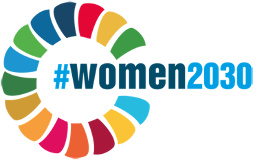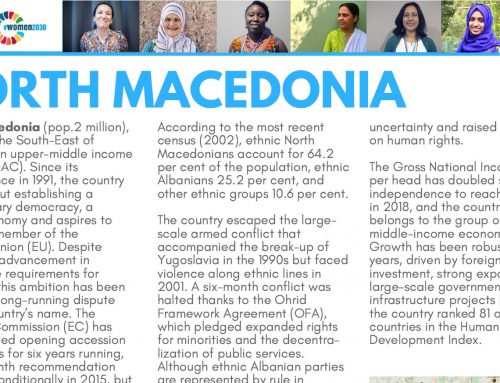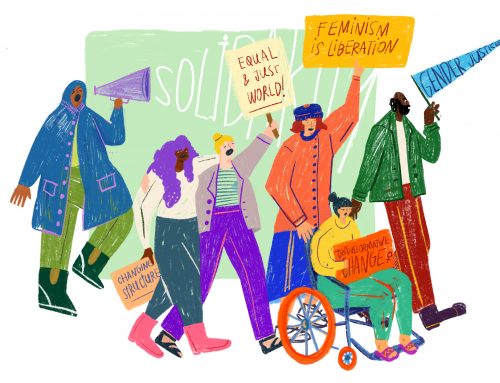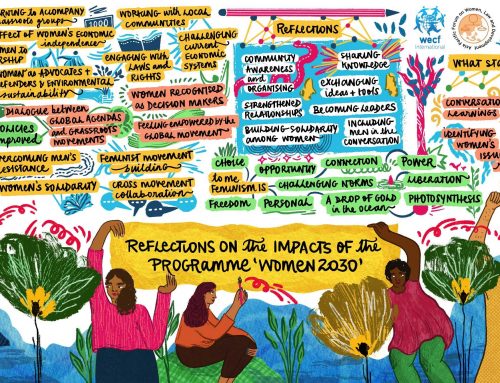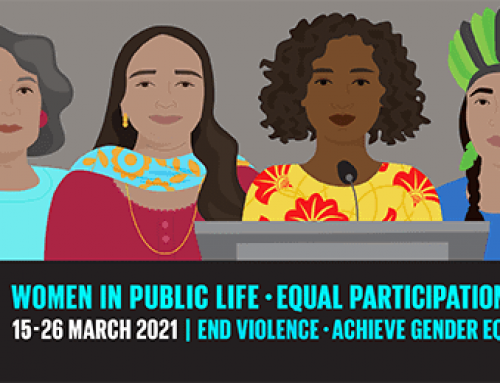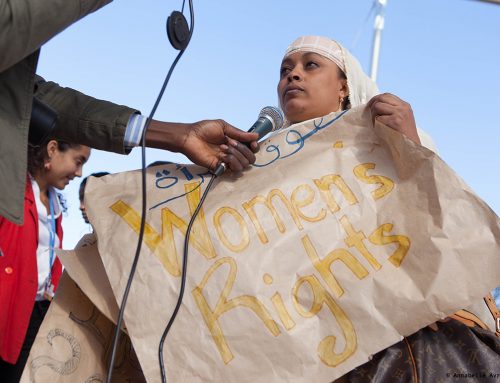by Rose Heffernan
This year’s Commission on the Status of Women (CSW65) had the priority theme of ‘women’s full and effective participation and decision-making in public life, as well as the elimination of violence, for achieving gender equality and the empowerment of all women and girls.’ As we have engaged in the CSW in previous years, we were pleased to be part of the official delegation of the German government alongside other civil society representatives and to host two parallel events on this year’s virtual NGOCSW65 platform. Additionally, we gave input to the Agreed Conclusions and collectively organised alongside other CSOs to promote our ecofeminist agenda. Our events were well attended, our first being ‘Why we need a feminist vision for Agenda 2030’ a culmination of the efforts of the Women2030 partners in promoting gender equality within the sustainable development goals, as well as the publication of the Global Shadow Report. Our other event: ‘Global feminist movement building for Generation Equality’ was discussion based and empowered attendees in the lead up to the Generation Equality Forum in Mexico and Paris, featuring Kyrgyz singer Zere Asylbek. You can watch recordings of both of our events here.
Due to the COVID-19 pandemic, this year’s CSW was online for the first time, rather than being held in person at the UN premises in New York. This presented both opportunities and challenges. The virtual platform of NGOCSW, on which 25.000 participants registered, meant that each of the 700 events could have many attendees and allowed those who could not travel to New York to participate more fully. Additionally, a sense of online community was created, as we worked and communicated with other civil society organisations (CSOs), which allowed for a broader range of co-operation with people we may not have met in New York. Unfortunately, one downside of this democratised digital space was that events were subject to online trolls, who attacked and disrupted some events trying to spread an anti-inclusive, non-feminist message. Our event ‘Why we need a feminist vision for Agenda2030’ saw some trolls, but fortunately this did not create a disruption, as our speakers and organisers dealt with it competently and professionally. Moving forward to CSW66, hybrid sessions combining digital and physical participants seems a good solution.
![]()
This year’s Agreed Conclusions, the outcome document of the CSW were published in April, following multiple reviews by member states, including a hand-full who tried to water down the language, with suggestions that moved backwards on agreed wording. We are however pleased to see paragraphs dedicated to the gender-environment nexus. In particular, the references to women as agents of change in climate change mitigation and adaptation. Also, the reference to integrating a gender perspective into the design, implementation, monitoring and evaluation of national policies on climate change is a step forward. Climate change’s disproportionate impact on women is also noted in the Agreed Conclusions. When discussing economic empowerment of women, the Agreed Conclusions note that women should have access to affordable energy, highlighting the important gendered dimension of the energy poverty nexus. However, the singular focus on private finance in response to climate change is erroneous and must be further expanded to include public finance and to ensure this is implemented in an equitable way that includes women in a just transition. It is a great weakness of the Agreed Conclusions that ‘just transition’ is not mentioned, which is essential to both Covid-recovery and the climate transition and needs to be gender-just.
The 2022 CSW66 priority theme will be ‘achieving gender equality and the empowerment of all women and girls in the context of climate change, environmental and disaster risk reduction policies and programmes.’ This is an opportunity for WECF to contribute our expertise in this field. One issue we must address is a handful of member states pushing for the watering down of the Agreed Conclusions. For example, this year’s Agreed Conclusions failed to include the newly adopted ILO Convention 190 to end gender-based violence in places of work, despite it being essential for this year’s thematic focus of the CSW. Another concerning aspect was that key language in the Agreed Conclusions were moved backwards on, specifically on priorities relating to youth and girls, transgender, and non-binary people. Women’s organisations have sent a letter to UN Women, articulating our positions on these issues, and encouraging the UN to continue to stand strong for the human rights of people of all genders. We will continue to argue for inclusive and intersectional language and encourage progressive Member States to advocate more strongly for these issues so that regressive states (such as in this year, Russia), cannot take full control of the agenda.
We are partaking in the #UnMute civil society campaign in the run up to this year’s High Level Political Forum (HLPF), the campaign argues for more civil society participation, speakers, and spaces on member state delegations. The campaign highlights the need for inclusive and meaningful civil society participation at the UN. As HLPF will be online this year (in July), there is a concern that CSOs will not be able to participate effectively. The #UnMute Campaign will be launched on July 3rd, using the hashtag #UnMute, calling for robust and effective CSO participation during the HLPF. We have seen from CSW65 that CSO participation is needed to hold governments accountable, and to ensure an inclusive discussion that will benefit the UN’s citizens. We look forward to continuing our work on the gender-environment nexus, reflecting on challenges and accomplishments from this year’s CSW.

